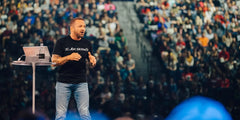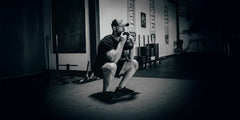

Chad Robichaux is a former Force Recon Marine, professional MMA fighter, bestselling author, and founder of the Mighty Oaks Foundation—an organization helping veterans, active-duty military, and first responders find faith and purpose beyond service.
At Uncharted Supply Co., we talk a lot about resilience—the kind that’s built through training, experience, and the will to keep going when things fall apart. Few people embody that better than Chad Robichaux.
From elite military operations and professional fighting to humanitarian work in Afghanistan and Ukraine, Chad has seen the extremes of both crisis and courage. We sat down with him to talk about survival, leadership, and the purpose that drives him today.
From Combat to Calling
You’ve deployed numerous times to war zones around the world, both in special operations and as a humanitarian. How did those experiences shape the way you see survival, leadership, and resilience today?
All of my experiences have shown me that when a life-or-death situation arises, your survivability will depend on three main factors:
- Your attitude. You must remain calm and focused on problem-solving and striving for a positive end result. This mindset will be much easier to achieve if you have the other two factors: training and equipment.
- Good training. You should try to predict likely scenarios you might find yourself in and think through or train for them. The 7 P’s apply here: Prior Proper Planning Prevents Piss Poor Performance. Professional training, books, and experience are all ways to prepare for future emergencies.
- The right equipment. You will never regret having a piece of gear that saves your life. Based on environments, threats, or potential emergency scenarios, store or pack the right equipment that may very well save your life or others.
The Turning Point
You’ve spoken openly about your struggle with PTSD after returning from Afghanistan. What was the moment you realized you had to turn things around, and how did that moment change your life trajectory?
It was when I recognized the damage I was doing to others. Once I saw how my pity and self-loathing led to self-destruction that had massive collateral damage on others, I knew I had to change my trajectory. I had tried many things, some good, some bad, but ultimately, the restoration of my faith in Jesus became the foundation for stability that resulted in truly sustainable change.

Preparedness vs. Paranoia
At Uncharted, we talk a lot about readiness without fear. How do you balance living prepared with living fully, without being consumed by “what ifs”?
Readiness, in my opinion, is the antidote to fear.
I do a lot of public speaking, in front of tens of thousands of people. It’s said that public speaking is the number one fear people have, and I’m often asked if I get scared or nervous. I don’t. But the reason I don’t isn’t because I’m not scared, it’s because I prepare a minimum of 10 hours for every one hour of speaking.
The more we are prepared for any potential danger, threat, or emergency, the less we will live in fear over those things.
The Mighty Oaks Foundation
Through Mighty Oaks, you’ve helped countless veterans and first responders. What do you think most people misunderstand about the struggles they face when they come home?
The main struggle veterans have isn’t what they’ve seen or done; it has to do with purpose. They had a clear mission and purpose, and they feel like taking off that uniform also took away their purpose. It’s important for us all to have a foundational purpose that doesn’t tie to the identity of a job that can be taken away or will inevitably change one day. Even a noble job like serving in the military, which they should be proud of, shouldn’t define their worth. We have to understand that purpose and value run deeper than an occupation.
Saving Aziz & the Afghanistan Evacuation
Your book Saving Aziz tells the story of rescuing thousands during the Afghanistan withdrawal. What did that mission teach you about human courage and community under pressure?
We’re overwhelmed by the news and social media showing division and negativity. However, during the story of Saving Aziz, I learned that humans can come together, despite differences, to do the right thing for their fellow human beings.

Faith & Resilience
Faith plays a big role in your work. How has spirituality helped you endure some of the toughest moments in your life, both on and off the battlefield?
Being resilient is holistic—mind, body, social, and spirit. We have to be mentally strong with the right knowledge, mindset, and perspective. We have to have healthy bodies, inside and out. We have to choose to surround ourselves with the right people. And we have to have a strong spiritual foundation, which leads us to live for something bigger than ourselves and something that outlives this lifetime.
For me, my relationship with Jesus, living through a biblical worldview and keeping my eyes focused on eternal living, completely changed my mindset, focus, and resilience.
From the Cage to the Mat
You were a professional MMA fighter and still train jiu-jitsu. How has martial arts influenced your discipline, mental resilience, and leadership?
Martial arts and competition have been part of my life for 45 years. The discipline it takes to train in anything that long requires a tremendous amount of commitment that I’ve taken off the mats and into every aspect of my life. Every day I step on the mats, it’s a lesson in humility, leadership, learning how to win and lose, perseverance, and becoming more and more resilient every day.

Modern Conflict Zones
You’ve continued humanitarian efforts in places like Ukraine. What lessons from those missions can everyday Americans take into their own lives about resilience, adaptability, and serving others?
Appreciation. It blows my mind to see Americans take so much for granted—our freedoms, liberty, safety, and the security of this great republic, the United States of America. As a nation, we need to become more aware of the privileges we have and the things we take for granted every day.
Advice on Grit
For someone facing personal battles, whether physical, mental, or emotional, what’s one practical step they can take today to start building resilience?
We all will suffer pain in life—it’s an inevitable part of living. But we get to choose which type of pain we will suffer.
Will you suffer the pain of self-discipline,
or will you suffer the pain of regret?
Dig in now and grind toward the things you choose to pursue.

Legacy & Mission
Looking ahead, what do you want your ultimate legacy to be, not just for your family, but for the next generation of warriors, leaders, and everyday people who look up to you?
I just want to leave the world better than I found it. I want to create something that pays forward the second chances I’ve had, something that will continue doing that even when I’m gone.
Closing Thoughts
In every line of Chad’s story, from the battlefield to the jiu-jitsu mat, there’s a lesson that resonates deeply with Uncharted’s mission: prepare well, live fully, and use what you’ve learned to serve others.
Chad’s life reminds us that resilience isn’t just about surviving—it’s about leading, giving back, and leaving the world stronger than we found it.


